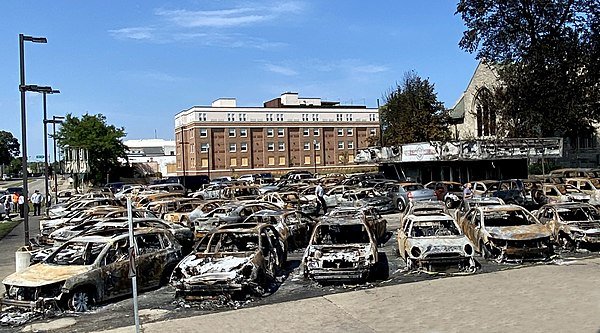
Maybe we should leave some stuff behind
“What We Carry: Balance” (encaustic on panel), by Helene Farrar, who is based in Manchester, Maine, which is on the Kennebec River.
Her site says:
Hélène Farrar has taught and worked in the visual arts for 20 years while exhibiting in commercial, nonprofit and university galleries in New England, New York City, Pennsylvania, Italy and England. Farrar has a B.A. in Studio Art from the University of Maine and a Masters of Fine Art Degree in Interdisciplinary Arts from Goddard College in Vermont. Hélène currently owns and operates her own private art school in Maine out of her “Farmhouse” studio, where she holds varied workshops and classes. Her paintings have most recently been accepted into curated exhibits at the Cape Cod Community College, Fuller Craft Museum, the Saco Museum, the University of New England Art Gallery and Twiggs Gallery.
Dark blue line is the Kennebec River.
Chris Powell: Gasoline-tax pandering in Conn.
I-95 crossing the Connecticut River in Old Saybrook/Old Lyme, Conn.
— Photo by JJBers Public -
MANCHESTER, Conn.
Are things getting so bad for the Democrats that even Connecticut's senior U.S. senator, Richard Blumenthal, is worried about winning re-election this year?
That might have been construed from the senator's silly pandering last week about gasoline taxes.
Blumenthal -- for 20 years the "eternal {state attorney} general" who now, at age 76, is seeking a third six-year term in the Senate -- called for suspending the federal gas tax, which is 18 cents per gallon. Because gas prices have risen dramatically in recent months, the senator said, people need immediate relief. Meanwhile, the senator added, the federal gas tax isn't needed because its revenue is dedicated to highways and the federal government has just appropriated billions of dollars for highways.
Blumenthal's rationale raised some big questions he didn't address.
That is, where did those billions of dollars for highways come from if not from federal gas taxes?
Mostly they were just created electronically from computer keystrokes.
And if finding money for highways is that easy, why has the country bothered with the federal gas tax in the first place -- or, for that matter, with any taxes at all?
While the federal highway fund may not need any revenue, Blumenthal's colleague in Connecticut's congressional delegation, First District U.S. Rep. John B. Larson, might remind him that the Social Security Trust Fund is projected to be insolvent in another decade and might be glad to take whatever money the highway fund doesn't need.
But even if the federal gas tax is suspended as Blumenthal and other members of Congress propose, people still will be paying its equivalent. Most just won't understand how they pay, nor that they are already paying -- through the devaluation of their money, the inflation tax on their wages and savings, which is already running at about 15 percent annually once the government's deceitful skewing of the data is corrected.
This inflation is largely a matter of the imbalance between government's money creation and national and -- since the U.S. dollar is the world reserve currency -- international production. Much more money lately has been created than goods and services have been produced.
Indeed, when it comes to government appropriations there is hardly any discussion anymore of where the money is to come from. It now is widely assumed that money is infinite, even as inflation screams that production is not.
Political responsibility for surging inflation is bipartisan, but since Democrats control the presidency and Congress, they will catch the blame. Blumenthal's pose on the gas tax shows he realizes this and is planning an escape.
A big part of the production problem is entirely a Democratic responsibility -- the Biden administration's crippling of U.S. energy production in pursuit of "greener" energy even as "greener" energy isn't close to being ready to replace the oil and natural gas supplies that are being diminished.
The environmental fanaticism of the Democrats is feeding Russia's imperialism toward Ukraine and the other former Soviet satellite states in eastern Europe. Western Europe has crippled its conventional energy production even more than the United States has and long has been heavily dependent on Russian natural gas, which can be cut off if its recipients get serious with economic penalties against Russia.
Meanwhile, since it has hampered its own energy production, the United States is unable to help Europe much at this crucial moment.
Until a few months ago Gov. Ned Lamont, a Democrat, and many Democratic state legislators sought to raise Connecticut's gas tax invisibly through a regional scheme to raise wholesale gas taxes without providing people with any transportation alternatives, though cars are a necessity for most in a state as suburban as Connecticut.
The explosion in gas prices and inflation has prompted the governor and those Democratic legislators to shelve their hidden gas tax idea. But the Democrats long have been Connecticut's tax-raising party and bear most responsibility for making the state so expensive to inhabit -- and for what? Are the state's cities any less destitute and violent? Are its poor any more self-sufficient? Are its socially promoted children any better parented and educated?
Or is inflation the main result of policy on the state level too?
Chris Powell is a columnist for the Journal Inquirer, in Manchester.
Chris Powell: $75 million could be spent better; stop hysteria over COVID home testing
COVID-19 home test kit.
MANCHESTER, Conn.
Connecticut Gov. Ned Lamont could have found worse things to do with the $75 million in federal emergency aid he ordered distributed last week as a bonus to poor households receiving the state's earned-income tax credit. On average those households probably have suffered more financially from the long virus epidemic, since many of their breadwinners hold, or held, the service-sector jobs that were the first to be cut back or eliminated.
Complaints from Republicans that the bonuses mainly will reward a constituency of the governor's party, the Democrats, as his re-election campaign begins are not so compelling. For nearly everything government does rewards some political constituency, and state law already had identified the earned income tax credit constituency as deserving. If Connecticut ever again has a Republican administration, it will be unusual if Republican-leaning constituencies -- if only ordinary taxpayers -- are not rewarded too.
The governor's dispensing that $75 million is troublesome for different reasons, starting with the disregard for democratic procedure.
The governor's office says the federal law that sent the emergency money to the state authorizes his administration to spend it on expenses incurred because of the virus epidemic. But the state has been paying its earned income-tax-credit obligations all along. No payments by the government were cut because of the epidemic. While many recipients surely suffered losses because of the epidemic, it's unlikely that all did, and no one receiving the bonus will have to show evidence of such losses. The expenses to be reimbursed here are merely being assumed.
Additionally, $75 million is a lot of money for state government to dispense out of the blue at the command of just one official, an amount never formally appropriated by the General Assembly. Indeed, as Republican legislators note, state law already had determined how much was to be spent on the tax credit. The bonus created by the governor overrides that legislation.
Since he still exercises -- at least until February -- emergency powers to rule Connecticut by decree, the governor presumably could have rewritten the tax-credit law by himself to authorize the bonus. But he did not do so, perhaps because it might have emphasized his gathering unnecessary power to himself.
Republican legislators note that Connecticut faces many other compelling needs apart from those of the tax-credit recipients and that ordinary democracy first would have summoned the legislature or legislative leaders to discuss how to spend the $75 million. That's why the governor's high-handedness here is another argument for letting his emergency powers expire.
Having continued for two years, the virus epidemic is no longer an emergency. While the epidemic will wax and wane as epidemics do, government is fully aware of what combating it may require. Most of all, combating it may require more medical facilities and staff, and thus, to finance them, fewer raises for government employees, fewer stupid imperial wars and that $75 million that instead will be spent to expand the tax credit.
That money might build a few hospital wards and hire more doctors, nurses, and auxiliary staff. It might buy and distribute antivirals and vitamins.
If the tax-credit bonus can be construed as an expense of the epidemic, surely expanding medical capacity and services could be construed similarly. With so much free money flowing from Washington, the federal government probably wouldn't object if Connecticut chose to get more relevant.
After all, unlike the tax-credit bonus, increasing medical capacity might benefit everyone who got sick.
Meanwhile government's frantic efforts to distribute home testing kits for the virus and the public's frantic efforts to obtain them seem misplaced.
Surely quite without a test most people can tell if they are sick with symptoms like those attributed to the virus, and surely most people with such symptoms might have enough sense to get to a doctor or hospital quickly, especially since early treatment of the virus is crucial to defeating it.
The people lately waiting in long lines for a home test kit for the virus well may be putting themselves at greater risk of contracting it. The virus is bad enough. Test hysteria induced by government will make it worse.
Chris Powell is a columnist for the Journal Inquirer, in Manchester.
Chris Powell: Amid most infections ever, time to reappraise pandemic policies
Graphic of COVID-19 infection by Colin D. Funk, Craig Laferrière, and Ali Ardakani.
MANCHESTER, Conn.
Connecticut doesn't audit the performance of any of its major and expensive state government policies -- not education, not welfare, not urban -- but now would be a pretty good time for state government to audit its response to the virus epidemic.
For the epidemic has consumed nearly two years of state government's focus, impairing everything important -- commerce, schools, mental health, social order and basic liberty and democracy themselves -- only for all official efforts to fail to stop the spread of the virus. New daily confirmed cases in Connecticut in the last week averaged almost 4,000, the most yet, and weekly "virus-associated" deaths are double what they were only a few weeks ago.
An increase in infections might have been expected as colder weather pushed people closer together indoors and because of the holidays. But then a decline in infections also might have been expected because of the state population's high degree of vaccination and face-masking -- that is, might have been expected if vaccines and face-masking really work as promoted.
But even government and government-friendly medical officials admit that the vaccines are quickly losing effect. Needing frequent "boosters," they aren't half as good as traditional vaccines, and there is growing concern that too many "boosters" may damage the human immune system.
This doesn't mean that the vaccines and masks haven't helped or that the epidemic might not be worse without them. It means that another approach to the epidemic is necessary -- greater emphasis on therapies, of which there are many, and not only the antiviral pills just developed by pharmaceutical giants Pfizer and Merck, which, like the vaccines themselves, are not yet adequately tested and thus full of risk.
Even government-friendly medical authorities acknowledge the correlation between virus infection and deficiency in Vitamin D, the "sunshine vitamin," especially in people with dark complexions, and many authorities recommend strengthening the immune system with Vitamin D and C and zinc supplements. Natural and manmade antivirals and anticoagulants abound and many studies have found them effective against the virus, especially if administered soon after infection.
Unfortunately at the outset of the epidemic, when medicine did not understand the virus, patients were commonly told only to go home and take cold medicine and return to a doctor or hospital if their symptoms worsened. But when their symptoms worsened, it was often too late to save them.
Now treatment is more sophisticated. On any particular day infections in Connecticut may increase by thousands but hospitalizations and deaths by only a few. On some days infections soar but hospitalizations decline. Many infected people have no symptoms and nearly all people survive infection.
Even government-friendly medical authorities also acknowledge the correlation between virus fatalities and "co-morbidities" like obesity and diabetes, which most people could control.
Gov. Ned Lamont announced last week that state government soon will distribute, without charge, millions of masks and virus tests that can be taken at home. While the tests may be helpful, there is no shortage of masks and the virus penetrates them easily. It might be far better for state government to help people understand that their immune systems and general fitness may be defenses as good as if not better than masks and vaccines, and if state government distributed free immunity-boosting vitamins and supplements and even gym memberships.
State and local government officials and the medical authorities on whom they rely have done their best in circumstances that have no precedent in living memory. But their good intentions don't vindicate mistakes.
Despite lockdowns, mandatory masks, vaccines, "boosters," and damage to society that will not be repaired for many years, Connecticut and the country are facing more virus infections than ever. So government should start questioning its policies and assumptions about the epidemic, including the assumption that the epidemic is so deadly that combating it must take priority over all other objectives in life.
What isn't working needs to change, if only to set an example for the other things in state government that, after long experience, don't work except to sustain the government itself.
Chris Powell is a columnist for the Journal Inquirer, in Manchester.
Chris Powell: Why it’s so tough to reduce domestic violence in our disintegrating society
Cycle of abuse, power and control issues in domestic-abuse situations
— Graphic by moggs oceanlane
MANCHESTER, Conn.
Connecticut, the state's Hearst newspapers found this month in a series of investigative reports, has not made much progress solving its domestic- violence problem. Of course studies of the state's other major problems might reach a similar conclusion, but one has to start somewhere.
Connecticut's main response to domestic violence is the protective order, with which a court warns an allegedly abusive party to stay away from the party who feels abused. The dark joke has been that every woman murdered by her husband or boyfriend dies clutching a protective order. That is, protective orders aren't terribly effective, as the Hearst series showed.
The series found that a protective order had already been issued in a quarter of the 15,500 domestic violence incidents reported to police in Connecticut in 2020. A fifth of domestic violence charges in the state's courts from 2016 to 2020 involved at least one violation of a protective order, and many of those charges were dismissed. Only about 20 percent of the 23,000 protective-order violations charged in those years resulted in convictions.
Most of those charges were resolved by plea bargains or the referral of the accused to a rehabilitation program.
And so about 300 people, mostly women, have been killed by domestic violence in Connecticut in the last 20 years. Many more have been injured.
The data call for more vigorous enforcement. But then so do the data for most crimes in Connecticut. For all criminal justice is a system of discounting charges via plea bargains and probationary programs, because there is far more crime than resources to prosecute them and because Connecticut's criminal-justice system strives most of all to keep perpetrators out of jail.
Other than domestic violence, it is hard to find any serious crime in Connecticut where the defendant doesn't already have a long criminal record but has remained free or suffered only short imprisonment, since the state lacks an incorrigibility law.
The Hearst series reported that domestic violence cases are discounted in court more often than equally serious crimes, but this is misleading, for domestic violence cases can be more difficult to prosecute. More of their evidence is uncorroborated testimony -- "he said, she said" cases -- more of their accusers lose the desire to testify, and fewer of the accused have long records indicating a danger to anyone besides their accusers.
As the stream of domestic violence deaths and injuries suggests, protective orders, rehabilitation programs and social workers are no substitute for speedy trials, convictions, and imprisonments. Meanwhile, there is always infinite demand for government to protect people against all the risks of life.
But government can't protect everyone from everything all the time, and, distracted by the virus epidemic, government now is less able to protect everyone from even ordinary threats. Until Connecticut is ready to prosecute, convict and imprison abusers quickly or to hire round-the-clock bodyguards for everyone threatened by domestic violence, people will have to be ready to protect themselves and take some responsibility for the awful partners they have chosen.
It's an unpleasant thought, but then nothing is gained by ignoring the social disintegration worsening all around, of which domestic violence is only one part.
xxx
Responding to recent commentary in this space, a reader writes that if Bob Stefanowski can get next year's Republican nomination for governor without a primary, he has a chance to beat Gov. Ned Lamont. But if Stefanowski has to run in a primary, "he will have to kiss up to every Trump-supporting, gun-toting, anti-abortion nut in the Republican Party" and then the nomination will be worthless.
Another reader counters: If Governor Lamont wins renomination by the Democrats without a primary, he has a chance to beat Stefanowski. But if Lamont faces a primary, "he will have to kiss up to every AOC-Squad-supporting, illegal-gun-toting, pro-abortion nut in the Democratic Party," and then his nomination will be worthless.
Yes, both parties have extremes that can dominate their primaries, and the governor has done a fairly good job tiptoeing away from his party's crazy left. Can Stefanowski get around his party's crazy right?
Chris Powell is a columnist for the Journal Inquirer, in Manchester.
Chris Powell: A joke on Danbury’s homeless
— Photo by Eric Pouhier
MANCHESTER, Conn.
Woody Allen movie fans might appreciate the joke that Danbury's Zoning Commission is playing on homeless people in the city and, really, on the whole state.
In Allen's spoof of Russian novels, Love and Death, the comic hero at last wins the woman he adores and on their wedding night puts his arm around her in their marriage bed. She replies: "Not here."
But if not there, where?
The Danbury News-Times reports that Pacific House, a Stamford-based organization that has been helping the homeless in Fairfield County for 20 years, has acquired a former motel building in Danbury with the help of the state Housing Department, which came up with $4.63 million to purchase the property. Pacific House has been operating it as a shelter under one of Gov. Ned Lamont's emergency orders. But the order expires in February and last week the Zoning Commission voted 6-3 against allowing the shelter to operate permanently.
Commissioners accepted complaints that the shelter will harm the character of the neighborhood -- as if homeless people roaming the city and nearby towns without the supervision and services that Pacific House provides won't risk the character of many neighborhoods.
Of course, those needing shelter are problematic, but the homeless are less problematic, more successfully treated, if their treatment begins with what is called "supportive housing." Once the trauma of having no safe place and privacy ends, sobriety and rehabilitation come easier, especially since the needed services -- medical, counseling, and transportation -- can be more centrally provided.
A former motel is perfect for supportive housing. Residents of such a facility may actually be less transient than the people who stayed at the motel. And while opponents of Pacific House's Danbury facility concede the need for a shelter in the area, they offer no other location even as Pacific House's facility is already operating.
Of course, only saints want to live near people who have problems. But people with problems have to go somewhere, and it's far better for them to go where they may be helped out of their problems than to be merely sheltered in a barracks overnight, out of the cold and damp, only to be shooed back into the cold and damp at daybreak.
When supportive housing has a responsible sponsor and state government's support, as Pacific House's facility in Danbury does, state law should exempt it from local zoning. So the issue in Danbury is one for the whole state and the General Assembly should address it urgently when it reconvenes in February.
xxx
Criminal penalties aim to set standards, deter, and punish, but for offenses less than murder they are not meant to ruin lives. For most offenses forgiveness can be earned.
But former Hartford lawyer Corey Brinson is asking for more than forgiveness for his conviction for fraud, his using his former law firm to launder money for stock swindlers while taking a cut. According to The Hartford Courant, Brinson is asking to be restored to a position of honor under state government -- commissioner of the Superior Court -- with reinstatement of the law license he lost with his conviction.
A lawyer disciplinary committee has voted 3-1 to recommend reinstating Brinson's law license, finding that he has rehabilitated himself after a three-year prison term. Maybe he has, but becoming a lawyer is a lot of work, and no one who becomes a lawyer has any excuse not to know that financial fraud is doubly wrong for a lawyer, an offense against the law itself as well as the privileged public office he holds.
The decision on Brinson's reinstatement rests with a committee of Superior Court judges. There is precedent for the committee to decide either way. Decades ago Connecticut's courts maintained that a felony conviction required a lawyer's permanent disbarment. But in recent years standards have been lowered and felonious lawyers have been reinstated.
Such reinstatements have set bad examples. They have shown lawyers that getting caught committing a serious crime is not necessarily the end of their professional careers, and thus have removed an incentive to maintain integrity. Such reinstatements also have diminished regard for the legal profession. But then maybe the profession no longer deserves much regard.-
Chris Powell is a columnist for the Journal Inquirer, in Manchester.
Panoramic view of Danbury in 1875, when it was known as the hat-making capital of America.
Chris Powell: Scenes from Weimar America; how about neither senile nor crazy, neither far left nor far right?
Adolf Hitler and his followers in 1932, the final year of the Weimar Republic (1919-1933). Genocide and world war followed.
Right-wing vigilante Kyle Rittenhouse shows his stuff.
Car lot destroyed by Kenosha rioters.
MANCHESTER, Conn.
With proto-Nazis and proto-Commies brawling in the streets across Weimar America, it may be more important than ever to recall Supreme Court Justice Felix Frankfurter's wry observation that "the safeguards of liberty have been forged in controversies involving not very nice people."
At best Kyle Rittenhouse is a stupid and reckless kid and a gun nut who enlisted in a search for trouble and found it in Kenosha, Wis., among rioters, some of them armed, who purported to be enraged by the shooting of a Black man by local police.
Carrying a military-style rifle, Rittenhouse went to Kenosha in the name of protecting property against rioters and ended up killing two of them and maiming a third, all of them white, as Rittenhouse himself is.
Rittenhouse was vigorously prosecuted but, supported by video evidence and even the testimony of a prosecution witness, he maintained that the three men he shot were attacking him, and the jury acquitted him.
Now, because the rioters Rittenhouse shot were rioting in the name of a Black man, the political left is portraying them as martyrs and Rittenhouse as a white supremacist, though there is no evidence that racial oppression was or has ever been his objective. This unfairness to Rittenhouse has prompted the political right to declare him a hero of the right of self-defense and the Second Amendment.
But there were no martyrs or heroes in the brawling in Kenosha, just idiots. When politics is stripped away, Rittenhouse's acquittal fits the facts as the jury could have found them, and if the political left and right were not so crazed and hateful they would be looking for heroes elsewhere.
Of course that's not likely to happen. Instead the Rittenhouse case is inspiring protests and confrontations throughout the country, including Connecticut, where a week ago a group that had been threatening to level the Amazon warehouse in Windsor because ropes resembling nooses had been found there began blocking traffic in the center of Manchester.
Blocking traffic is a good way of looking for trouble too, especially when so many people are stressed and on edge because of the lengthy virus epidemic. People protesting in the name of environmental protection lately have been blocking traffic in the United Kingdom and getting attacked by people trying to get to work.
So as the Rittenhouse verdict protesters were blocking traffic in Manchester, a car stopped in front of them and then slowly pushed through them before driving off. The protesters were able to get out of the way and no one was really hurt, but they all were indignant that their lawbreaking wasn't appreciated but instead was resented as a provocation.
Indeed, some of them are gun nuts just like Rittenhouse and have carried and displayed guns at their previous protests, though no one has been threatening them. In Manchester last weekend they claimed to be armed as well and seemed to want to be considered heroes for not shooting at the car that had nudged them out of the way.
There is good identification of the car and if the police locate and arrest the driver maybe Manchester will be the scene of another trial to which racial implications will be falsely and opportunistically attached. As in Kenosha, MSNBC and Fox News could cover it and designate new heroes and villains, and the verdict could set off its own protests and riots.
Or maybe, realizing that there are still many more civilized ways to make a point, people could resolve to make their points without getting into each other's faces, even if that is less dramatic and satisfying to the ego.
xxx
A national poll three years ago found that nearly half the country questioned President Trump's mental stability and intelligence. Now another national poll has found that about half the country questions President Biden's mental fitness for his office and believes that his health is deteriorating.
Unfortunately, other polls say Vice President Kamala Harris's standing with public opinion is even worse.
So the next act of politics in Weimar America may be the restoration of Trump, unless someone soon can start a sensible third party whose platform might be simple:
Neither crazy nor senile, neither far left nor far right.
Chris Powell is a columnist for the Journal Inquirer, in Manchester.
Chris Powell: Yes, married people are healthier and more prosperous than unmarried folks
—Graphic by Samuel James
A black tie wedding reception held at the Society Room in Hartford, Conn. It needn’t be this fancy!
MANCHESTER, Conn.
You’d never know it from the constant clamor by Connecticut’s news organizations and politicians about “domestic violence,” but the wisdom of the ages may still apply insofar as two people can keep living as cheaply as one — at least if they can stand each other. Not all married people in Connecticut or throughout the country are trying to kill their spouses.
For a study published Oct. 5 by the Pew Research Center confirmed the old saying. The study reported that married and romantically partnered couples in the United States are more prosperous and healthier than single people.
The study’s bad news is that the married share of the population has been declining for 30 years and a larger share of the population now remains single well into adulthood.
Of course in theory single life may leave people with more options. Unfortunately their greater chance of getting stuck in poverty or illness may curtail their options. While in some respects people curtail their options by marrying, in other respects their greater prosperity increases their options.
The growth in the single adult population implies the disaster that the country long has been facing with childrearing. Children can’t have too many people to love, protect, and encourage them, but these days millions of children are lucky to have even one parent or guardian and so they start life at a disadvantage, compounded by government’s failure to draw policy conclusions from studies like this new one.
xxx
What has the Republican Party done this year to earn the resounding approval it has gotten in the most recent national poll by the Gallup organization?
Nothing. The Republicans have just sat around like everyone else watching as the incompetence of President Biden and his administration makes the country miss Donald Trump.
According to Gallup, more people now consider the Republicans superior to the Democrats on both economic issues and international affairs. Some polls even show Trump leading Biden in a hypothetical presidential rematch in 2024, though it is hard to imagine Biden maintaining the necessary stamina for even another year.
Of course 2024 is a long way off. But campaigns are already starting for next year’s elections for Congress, and the Democratic majorities there are paper thin. A switch to Republican majorities seems likely.
More than dissatisfaction with the Biden administration would be required to make next year’s Republican nominations for governor and Congress desirable in overwhelmingly Democratic Connecticut. But in addition to crime, Connecticut is full of serious issues that state government long has overlooked. Maybe the national polls will encourage Connecticut Republicans to try getting more relevant.
xxx
Now that the supply of dollars has been cut off with the fall of the U.S. puppet regime in Afghanistan, Reuters reports that officials of Western governments and the United Nations are working to turn the spigot back on to prevent the country’s economic collapse. The new theocratic fascist Taliban government is no more capable of running the country than the puppet regime was. Indeed, Afghanistan is hardly a country at all, more like a grouping of medieval tribes.
The plan, Reuters says, is to get money to the Afghan people without also underwriting the Taliban. This is a silly delusion.
For a gangster regime like the Taliban easily can confiscate whatever it wants from the people, and any money sent to and kept by the Afghans will make them more content to be ruled by the gangsters. But hunger and general privation may encourage Afghans to overthrow the regime.
The Biden administration’s abrupt withdrawal from Afghanistan forfeited to the Taliban military equipment worth hundreds of millions of dollars. The Taliban can sell that equipment to Iran or China and already may have begun to do so. In any case under U.S. occupation the Afghans had their chance to build and sustain a decent government. Being so primitive, most Afghans couldn’t have cared less, and the United States was stupid for thinking they ever might have cared.
If the Afghans are hungry or need medicine, their country has great mineral wealth and can sell the mining rights to China, which, having a gangster regime itself, will have no problem underwriting gangsters elsewhere.
Chris Powell is a columnist for the Journal Inquirer in Manchester.
Chris Powell: Why no one outbid the asset-stripper Alden for famous newspapers
MANCHESTER, Conn.
More complaining about Alden Global Capital's dismemberment of the storied newspapers it recently acquired from the Tribune chain appeared this month in a long and -- to journalists, anyway -– infuriating essay in The Atlantic magazine by its reporter McKay Coppins. {Alden, an asset-stripping operation, also owns the Boston Herald.}
This dismemberment, Coppins noted, includes the Chicago Tribune's former headquarters, the landmark Tribune Tower, which has been converted into an apartment building.
But at least what remains of the newspaper still has modest offices in an industrial area across town near the newspaper's press. Another former Tribune property, The Hartford Courant, no longer has even that much. Somehow Alden acquired the Courant's headquarters on Broad Street in Hartford and kicked the newspaper out even before acquiring the Courant itself and the other Tribune papers. The Courant now seems to be entirely a work-from-home operation, and like several other Connecticut papers, including the Journal Inquirer, now is printed by the Springfield Republican. The Courant's address has become a post office box.
From Los Angeles to Chicago to Baltimore to New York and to Hartford, how the mighty have fallen, though the journalists who remain in the formerly great papers of old soldier on bravely and sometimes well.
Of course, the dismemberment of the former Tribune papers is just part of the decline of serious state and local journalism generally. But while Alden may seem especially predatory in its liquidations, the company is not a cause but just a symptom of what has gone wrong with the news business -- and not just the rise of the Internet and the transfer of advertising there but, more so, the public's loss of interest in state and local news.
This is in large part a matter of declining demographics.
After all, newspapers survived major challenges from competing new technologies before -- first radio and then television, whose main products are entertainment, not news, and whose state and local news reporting always have been and remain weak. Even now anyone who wants to be well informed about state and local government and community events and to participate in public life has to subscribe to a newspaper.
While some places -- including Connecticut -- now have a few Internet sites providing state and local news, most are niche operations that don't attempt to serve any area comprehensively. They concentrate on government and their audiences tend to be smaller even than newspaper audiences. They are not any more profitable than most newspapers, and many are operated as nonprofits supported by donations, if sometimes large ones from foundations. This method of operation is hardly a business plan and may subject the internet sites to more political pressures than advertising subjects newspapers to.
But if more people wanted state and local news and commentary, newspapers and news-based Internet sites would have more readers, and as their audiences grew, they might become profitable from increased advertising.
The movement to convert newspapers to nonprofits and to operate Internet news sites that way presumes that substantial interest from the public is no longer attainable.
It is hard to argue with that presumption. After all, throughout the country and even in Connecticut most young people, the products of social promotion, graduate from high school without ever mastering basic math and English. Most gain little if any knowledge of the country's history and civics. Even in Connecticut, a comparatively wealthy and well-educated state, the typical high school graduate or college freshman cannot identify the three branches of government. (You know: the lawyers, the teacher unions, and the liquor stores.)
That is, most young people are not being prepared to become citizens in a democracy, much less followers of state and local news.
This may be the underlying reason that Alden is liquidating so much of the former Tribune papers, draining away their capital, like their real estate, and why no one outbid Alden for the Tribune papers with the confidence that solid journalism could be made profitable again. For the future isn't just disruptive technological change but also social change, which may be far more disruptive.
Chris Powell is a columnist for the Journal Inquirer, in Manchester.
An earlier Hartford Courant Building, in about 1900
Chris Powell: Since epidemic is permanent, emergency powers should end; housing price crisis
“The Plague of Athens” (c. 1652–1654), by Michiel Sweerts, illustrating the devastating epidemic that struck Athens in 430 B.C., as described by the historian Thucydides
MANCHESTER, Conn.
Connecticut Gov. Ned Lamont seems inclined to ask the state General Assembly to extend his emergency powers again to deal with the virus epidemic when they expire at the end of the month. The governor’s request likely would be for another 90 days. The legislature should decline.
For starters, while the epidemic continues and is expected to continue indefinitely, there no longer is an emergency.
An emergency is something that is sudden, unexpected, and urgent. But the governor’s emergency powers have been in effect for more than18 months, the epidemic has become a way of life for everyone, and nothing about it is sudden, unexpected, and urgent.
For months Connecticut has been dealing well with the epidemic, and the governor can take much credit for that. But he will not deserve credit for changing the definition of “emergency.” When something becomes permanent, it’s not an emergency anymore.
At the beginning of the epidemic state legislators were only too happy to abdicate to the governor and run home and hide under their beds even as their constituents trudged on, trying to keep working as best they could, when they were allowed to work at all.
Now even legislators have discovered they can adapt with Internet meetings and “social distancing” in the workplace. The General Assembly held a relatively normal legislative session this year.
So there’s no reason for the legislature to keep deferring all epidemic-related policy decisions to the governor. The legislature is fully capable of reviewing his emergency declarations, enacting some into statute and nullifying others, and fully capable of approving or rejecting his additional proposals and involving the public through hearings in person or on the internet.
Just as important as the procedure for resuming normal government is the substance. The governor’s emergency rules long have touched nearly every aspect of life — business, commerce, schools, restaurants and more. It is hardly possible to leave one’s home for even a half-hour without having to comply with some executive order that was not in place a year and a half ago, an order issued directly by the governor or by municipal officials to whom he has delegated authority.
Democracy requires the people’s assent to such rules through their elected representatives. Otherwise Connecticut has reverted to monarchy. While it has been a benevolent monarchy so far, even that risks eroding the state’s habit of democracy, which was already fragile enough before the epidemic.
If a real emergency descends on the state after Sept. 30 — an asteroid strike, a solar flare, a plague of frogs or locusts, or anything else Connecticut hasn’t been handling for 18 months already — the governor can always ask legislative leaders to abdicate to him again. Until then, ordinary democracy should resume, and legislators who are unwilling to do the jobs they were elected to do should resign and let the people choose replacements.
Picture by IDuke
Anyone in Connecticut who owns his home may be rejoicing over the Federal Housing Finance Agency’s report two weeks ago that house prices in the state have risen 20 percent in the last 12 months. But actually this is a disaster, since housing is, like food, a necessity of life, and homeownership is the primary mechanism of giving people a stake in society generally and their community particularly and of building generational wealth.
Of course, the problem is not peculiar to Connecticut. Nationally house prices rose 17% in the last year, the main reasons being the de-urbanization stoked by the virus epidemic, inflation, and interest rates that have been pushed below the inflation rate by the Federal Reserve, which is pumping up asset prices to protect the wealthy while the poor choke.
But housing prices are Connecticut’s problem all the same, and rising prices for houses are pulling up rental housing prices as well, squeezing the poor. Higher prices for necessities reduce discretionary income and thereby risk weakening the economy.
The solution is for government to enable the market to increase supply — to loosen land-use restrictions and allow conversion of vacant commercial properties to housing. But will people sitting on another 20% in unrealized capital gains cooperate politically?
Chris Powell is a columnist for the Journal Inquirer, in Manchester.
Chris Powell: Appeal on abortion won’t lure Texas firms to Conn.
M ANCHESTER, Conn.
While he tries to be a moderate Democratic governor and indeed is more moderate than his predecessor, Connecticut’s Ned Lamont still feels obliged to make regular obeisance to his party's left wing, which constitutes a majority of the party's activists. So last week the governor posted on his social media channels a minute-long video encouraging businesses in states that are restricting abortion to relocate to Connecticut.
Connecticut, the governor said, is "family-friendly" and its liberal abortion law "respects" women.
The new abortion law in Texas is not just almost prohibitive but bizarre, delegating enforcement to civil lawsuits for damages. But it would not have been enacted if Texas was not full of women whose idea of respect includes protecting what they call the pre-born. The women of Texas are fully capable of getting the law repealed.
In the meantime, Connecticut's pitching businesses in Texas and other states restricting abortion is ridiculous, as is a similar appeal made to Texas businesses the other week by Chicago's economic-development agency, which placed an advertisement in the Dallas Morning News.
The Chicago agency's chief executive, Michael Fassnacht, told Bloomberg News: "We believe that the values of the city you are doing business in matter more than ever before." But of course the "values" of Chicago encompass scores of shootings and dozens of murders almost every weekend, while the "values" of Illinois include the country's worst insolvency.
Connecticut does not have the violent crime of Chicago, nor is Connecticut quite as insolvent as Illinois. Connecticut has advantages of climate, geography and culture. But in friendliness to business, Texas clobbers Connecticut and Illinois, having no corporate- and personal-income taxes while Connecticut and Illinois have both.
The Tax Foundation says the personal-tax burden in Connecticut and Illinois is above 10 percent but is only 7.6 percent in Texas. That is, Connecticut's personal-tax burden is almost a third higher than that of Texas.
Not surprisingly, Texas long has been gaining population relative to the rest of the country while Connecticut has been losing.
With such a differential in taxes, even Texas businesses opposed to the new abortion law might save so much money by staying put and not relocating to Connecticut that they could afford to pay for their employees to come to Connecticut for abortions every year.
No amount of the governor's pandering to his party's left wing will make Connecticut's high taxes "family-friendly."
Nevertheless, higher taxes well may be on the way for Connecticut, since the governor and Democratic leaders in the General Assembly seem inclined to revive in a special legislative session what they call the Transportation Climate Initiative. The plan would raise wholesale taxes on gasoline so the added burden wouldn't be as visible as the retail tax and would claim that the new revenue would be spent on transportation projects that reduce pollution.
But the state is already rolling in emergency federal money and billions more in federal "infrastructure" appropriations may arrive soon, so Connecticut hardly needs more gas tax money.
Raising gasoline taxes will be most burdensome to the poor and middle class even as inflation is already roaring and eroding their living standards. Further, it would be unusual if any money raised by state government in the name of transportation wasn't diverted.
With its taxes already so high, state government needs mainly to set better priorities.
xxx
Last week Governor Lamont announced with some pleasure that his administration will close another prison, the one in Montville, because the state's prison population is declining so much.
When the announcement was made four people had just been shot in separate incidents in Hartford over the Labor Day weekend, making nine shootings there for the previous week. There had just been four shootings in New Haven as well. The day before the prison announcement a Hartford man, a chronic offender, earned his 14th conviction and was sent back to prison.
The rise in violent crime and the failure to deter repeat offenders could make prison closings seem premature.
Chris Powell is a columnist for the Journal Inquirer, in Manchester.
Chris Powell: Censorship undermines faith in medical science
MANCHESTER, Conn.
Science is wonderful. But it is not always settled. Sometimes the prevailing view in science is wrong, especially in medicine.
For 2,000 years a primary treatment for disease was bloodletting, sometimes administered with leeches. Doctors don't do that anymore.
A sedative called thalidomide was approved for use in European and other countries in the 1960s before it was found to cause birth defects.
The painkiller OxyContin, about which federal litigation is raging because of its highly addictive and even deadly properties, was approved by the U.S. Food and Drug Administration in 1995. A year later an FDA official involved in OxyContin's approval was hired for a six-figure job at the drug's manufacturer, Stamford-based Purdue Pharma. Now the drug is blamed for thousands of deaths.
Medical mistakes are considered the third leading cause of death in the United States.
This week it was reported that the Food and Drug Administration had given full, formal approval to the Pfizer vaccine for the COVID-19 virus. But the FDA seems just to have extended the vaccine's authorization for emergency use.
Whereupon the acting commissioner of Connecticut's Public Health Department, Dr. Deidre Gifford, urged state residents to "trust the science" and get vaccinated.
It would have been fair to ask the commissioner: Whose science, exactly?
Of course, the commissioner wants people to follow the government's science. But there is other science, though it is increasingly subject to censorship by Internet sites and social media under government pressure.
Yes, quacks and cranks infiltrate discussion of the virus epidemic, as they always have infiltrated medicine. But the discussion also includes many highly credentialed doctors and scientists who -- at least before they voiced objections and concerns -- were renowned and honored in their fields. Some dispute the safety and effectiveness of the vaccines, while others dispute the vaccines' necessity, arguing that effective treatments for the virus are available.
These doctors and scientists could be mistaken. But censorship isn't how contrary assertions should be handled. Contrary assertions should be rebutted and learned from in the open.
This isn't happening because government, its allied medical authorities, and, it seems, journalism don't want a debate that might interfere with their preferred policy, vaccination. They are convinced that they have nothing to learn from the dissenters.
But the public isn't convinced. Many people are indifferent or even opposed to COVID-19 vaccination, and the policy advocated by many in government and the medical establishment is to stop trying to persuade people and start coercing them by denying them the right to live ordinary lives if they don't get vaccinated.
Much indifference and much opposition to vaccination are grounded in ignorance and contrariness. But not all.
Anyone paying attention to developments can perceive fair questions. For example, in regard to the Pfizer vaccine particularly, why is the government pushing it when it is still being tested and side-effects are still being discovered? Is this "approval" really a matter of safety or just political necessity?
And why is Israel's epidemic worsening, with a new wave of virus cases exploding to the level of the country's first wave even though Israel's population now may be the world's most thoroughly vaccinated -- primarily with the Pfizer vaccine?
The more what is said to be science relies on censorship and coercion, the less trust it will deserve.
Taliban religious police beating a woman in Kabul on Aug. 26, 2001.
- Photo by RAWA
If the thousands of Afghans who have swarmed the airport in Kabul for airlift out of the country really think that their country's new Taliban regime will be so terrible, where were they a few weeks ago when the U.S. military began withdrawing from the country?
Why did those thousands not enlist in the Afghan army in defense of the less totalitarian culture the U.S.-assisted government supported?
Those thousands might have formed a few useful military divisions, just as throughout history civilians were mobilized to defend cities under siege. Since women will be oppressed by the Taliban again, where was the Afghan army's 1st Women's Infantry Division? And how will Afghanistan's prospects be improved by removing so many people who oppose theocratic fascism?
Chris Powell is a columnist for the Journal Inquirer, in Manchester.
Chris Powell: When in doubt punt to avoid irritating public
MANCHESTER, Conn.
Gov. Ned Lamont seems to realize that Connecticut probably won't stand for another catastrophic lockdown in the name of controlling COVID-19, a virus that 99.8 percent percent of afflicted people survive. But rather than acknowledge this plainly and caution people that they must take the primary responsibility for protecting themselves, the governor has passed the buck to the state's 169 municipal governments.
The governor is putting them in charge of determining whether and where people should be required to wear masks again. This may lead to giving local officials the authority to set other rules of virus safety.
With the cities lagging badly in virus vaccinations, their mayors seem eager to order masks back on, which will push retail and restaurant business out of the cities and into the suburbs, as if city businesses can afford it.
Local option on virus safety makes little medical sense. Crowds in a suburb may pose no less risk than crowds in a city. But henceforth the resentment felt about the virus epidemic and government's regulations about it may be directed at mayors and town councils instead of the governor.
Lamont is a Democrat and Republicans long have wanted the General Assembly to end his emergency authority to rule by decree, and now, with his epidemic management no longer so successful, the governor may be happy to go along. Call it decentralization, with potentially different rules in 169 little republics and thousands of offices, stores, and restaurants.
Treatments vs. Vaccines
While the government and the medical establishment keep insisting that the virus vaccines are absolutely safe, every week brings word of a new side-effect unknown when the vaccines were authorized for emergency use and said to be so safe. The other week the vaccines were linked to eye problems.
Meanwhile the virus is mutating into "variants," more vaccinated people are becoming infected if not seriously ill, and there are signs that the vaccines may lose effect with time, perhaps as little as six months, thereby requiring frequent booster shots or entirely new shots each year, like ordinary flu shots.
So maybe eventually the government and medical authorities will start wondering whether the approach to the virus should shift to treatment and away from vaccination.
After all, doctors and hospitals have learned to treat virus patients with far more sophistication than shoving ventilators down their throats, as was the practice at the beginning of the epidemic. Does anyone remember the clamor a year and a half ago for production of millions more ventilators? They turned out to kill as many patients as they saved and the clamor stopped.
For there are effective treatments for COVID-19, and two more were announced the other week by Israeli scientists.
The first was about a study validating use against the virus of the anti-parasite drug ivermectin. Its efficacy has been established by other studies but U.S. authorities seek to suppress it lest it interfere with the vaccine campaign.
The second announcement revealed that a medicine based on the CD24 molecule, found naturally in the human body, cures 93 percent of seriously ill virus patients in less than five days.
These treatments appear to be inexpensive and unlike the vaccines have no side-effects. Also unlike the vaccines, there's no big money in them, which may be their weakness.
“Equity’ Isn’t Fair
Government in Connecticut has a funny idea of what it calls "equity.”
Marijuana-retailing permits are to be reserved for "communities" that disproportionately suffered from the futile "war on drugs." But those "communities" also disproportionately profited from the contraband drug trade. For every drug dealer who was prosecuted there were several who made a lot of money and were never caught.
So where is the patronage for people who, despite the futility of the "war on drugs," obeyed the law and forfeited their chance to profit from contraband?
And to overcome skepticism about the COVID-19 vaccines, government is offering prizes and cash bounties to people who accept vaccination after rejecting it so long.
So where are the prizes and bounties for the people who, heeding government's urging, got vaccinated as soon as they could?
"Equity" sounds mainly like a way of discouraging questions.
Chris Powell is a columnist for the Journal Inquirer, in Manchester.
Diversifying a rural N.H. college
The Lyons Academic Center at New England College, in Henniker, N.H.
Via The New England Council (newenglandcouncil.com)
BOSTON
“In a state where colleges and universities struggle to recruit racially diverse student bodies, New England College, whose main campus is in Henniker, N.H., has gained recognition for its commitment to recruiting diverse students. To date, 36.2 percent of the college’s 1,135 resident students identify as African-American, Hispanic, Asian, or more than one race.
“New England College’s success comes as a result of a recruitment strategy overseen by the college’s president, Michelle Perkins. Through this strategy, demographic data provided through standardized testing is purchased and then used to identify and target racially diverse students for recruitment. Moreover, New England College focuses this recruitment tactic on students from working-class communities in locations in and outside of New England, such as Philadelphia, New York and parts of Florida.
“When others doubted President Perkins’s goal of achieving campus diversity in a rural area of predominantly white New Hampshire, her response was simple: ‘I didn’t believe it.’
“‘We’ve invested a lot in identifying students from all over the country. A lot of them are first-generation college students. Usually, when you are a first-generation student, you have financial needs. We are very generous in our scholarship and grant programs,’ she explained.’’
Henniker Bridge, over the Contoocook River, connects the college’s main campus with its athletic fields and the town center and is listed on the New Hampshire State Register of Historic Places.
— Photo by ctchmeifucan
New England College’s Institute of Art & Design in Manchester, N.H.
Chris Powell: To end corporate welfare, cut taxes for all business
“The tax collector's office’’ (1640), by Pieter Brueghel the Younger
MANCHESTER, Conn.
At Connecticut Gov. Ned Lamont's order, state government is reducing its direct subsidies to businesses coming into the state or expanding here -- cash grants, discounted or forgivable loans and tax credits. These subsidies have reeked of political patronage and corporate welfare, have sometimes cost more than they gained, have incurred financial risk to the government, and have been unfair to businesses already in the state, which get nothing for staying.
The Lamont administration's new idea is to subsidize incoming businesses by rebating to them some of the state income taxes paid by their employees. This would incur little financial risk and expense to the state.
But this system still wouldn't be fair, for unless the line of business of the new company was unique in the state, state government still would be subsidizing the new company against its in-state competitors.
Last week, the Yankee Institute offered a better and perfectly fair idea: Eliminate grants, loans and tax credits to new businesses and simply repeal Connecticut's corporation business tax.
The Yankee Institute suggests that the tax's annual revenue to state government, averaging $834 million per year, isn't so much, only about 5 percent of the state's general-receipts.
This analysis underestimates the problem, since state government never can bring itself to reduce spending at all. But to make Connecticut much more attractive to business, it would not be necessary to repeal the whole corporation business tax. Repealing even half of it would send a remarkable signal around the country.
Of course, state government is always enacting tax cuts for the future and then repealing them when the future arrives. So to be believed, a corporation business tax cut would have to offer a contract to every business in the state and every arriving business guaranteeing that its tax would not be raised for, say, 20 years. But a big differential between Connecticut's business taxes and those of other states really might pay for itself far better than spot subsidies.
xxx
OVERKILL ON YEARBOOK: Pranking high school yearbooks is a tradition almost as old as the yearbooks themselves. What would any high school yearbook be without a defaced photograph or gross caption?
But police in Glastonbury, Conn., are treating the recent yearbook pranking there as a felony, having charged the suspect, an 18-year-old student, with two counts of third-degree computer crime, each count punishable by as much as five years in prison.
That makes the offense sound like terrorism.
Meanwhile, young people with 10 or more arrests, many of them on serious charges like assault, robbery and car theft, are being released by Connecticut's juvenile court system without any punishment at all and now apparently are moving on to kill people, confident that the state lacks the self-respect to punish them for anything.
The irony here probably will turn out to be superficial, for the Glastonbury student almost surely will get similarly lenient treatment from the criminal-justice system, whose dirty little secret is that it seldom seriously punishes anyone for anything short of murder, seldom at all for a first offense.
If the offenses attributed to the student occurred before he turned 18, he may qualify for "youthful offender status," whereby a criminal case is concealed and offenders can be let off, maybe with a little social work, and no public record of their misconduct is maintained.
If the offenses occurred after he turned 18 and he is a first offender, the student can apply to the court for "accelerated rehabilitation," a probation that suspends and eventually cancels prosecution and erases the charges.
So despite his serious charges, the student won't be going to prison. But since the publicity will make the case harder to whitewash, the court might grant the student "accelerated rehabilitation" on condition of a public apology, especially since the yearbook publishing company, with spectacular generosity, has agreed to repair the yearbooks without charge.
Turnabout being fair play, the best justice here might come if the newspapers published and television stations broadcast the student's mug shot with various defacements and a gross caption to see how he likes it.
That might send him well on his way toward a career in computer hacking, politics or journalism.
Chris Powell is a columnist for the Journal Inquirer, in Manchester.
Chris Powell: Nimbyism around New Haven airport vs. the public interest; anti-ID insanity
Tweed-New Haven Airport, alongside Long Island Sound
MANCHESTER, Conn.
Municipal zoning that controversially excludes inexpensive housing in the suburbs isn't the only area where Connecticut long has allowed the local interest to thwart the broader public interest. That is also the story of Tweed-New Haven Airport.
The governor, business leaders and most residents in the New Haven area who pay any attention favor improving Tweed so that people in the southern part of the state don't have to drive an hour or two to catch a flight that might not take even that long. The New Haven area, with plenty of commerce, industry and universities, including Yale, almost surely could support a real airport of its own, and such an airport would support the area's economic growth.
But since 2009 Connecticut actually has made it illegal to improve Tweed. That's when state legislators representing neighborhoods near the airport persuaded the General Assembly and then-Gov. Jodi Rell to enact a law forbidding the extension of the airport's runway beyond the current 5,600 feet even as a 7,000-foot runway is necessary to accommodate modern jetliners with enough seating to make serving the airport profitable.
Two years ago a federal appeals court found this state law contrary to federal law and invalidated it. But no matter how obvious the benefit of improving Tweed was, Connecticut still didn't repeal the law. At least now state government, New Haven city government, and town government in East Haven, where some airport property is situated, are working together not just to extend the runway but also to build a better terminal building and relocate airport access to the East Haven side.
The details of the plan may be arguable. Airport operator Avports will get a 43-year lease on Tweed and commit to spending millions of dollars improving it. The Tweed-New Haven Airport Authority, which is run by a board consisting of local residents, will lose control of the airport, but New Haven won't have to subsidize it anymore. Avports will solicit more flights to serve Tweed, for which the prospects are good, and a new budget airline is already planning to come in, though of course it may not survive long.
There may be stumbles and a "temporary" subsidy eventually might be sought from state government. Someday Tweed might even be taken over by the Connecticut Airport Authority. But state government already subsidizes the state's major airport, Bradley International, in Windsor Locks, and nobody complains about that, given the airport's huge contribution to Connecticut's economy and quality of life.
Tweed has been operating for 90 years, so no one living nearby can be surprised by the desire to improve it to keep up with population and economic growth. What might be surprising to people unfamiliar with Connecticut is that it has taken the state so long to get around to making Tweed really useful.
But then if a referendum on the state motto was ever called, no one in Connecticut could be surprised if the Nutmeg State’s official motto, Qui Transtulit Sustinet (“He Who Transplanted Still Sustains’’) is replaced by Non in me postica -- "Not in my backyard."
xxx
Just think of how comprehensively racist the country must be if, as the incessant racial prattle complains, requiring people to present photo identification when voting is racist.
For people routinely may be required to produce photo identification when, among other things, buying alcoholic beverages and tobacco products; when applying for a job, a bank account, a car loan, or home mortgage; and when boarding an airplane or entering a casino.
The purpose of requiring photo identification in those circumstances is simple: compliance with the law and prevention of fraud. Those are the same purposes for which presentation of photo identification when voting should be required.
Yes, some poor souls don't have photo identification, but most jurisdictions will provide general all-purpose photo IDs to people who can produce at least their birth certificates and evidence of an address.
Indeed, to facilitate violation of federal immigration law, Connecticut will provide driver's licenses and New Haven city government will provide city identification cards even to immigration lawbreakers.
Having to prove one's identification isn't racist at all. It's a small duty of modern citizenship.
Chris Powell is a columnist for the Journal Inquirer, in Manchester.
Chris Powell: Is infamous hedge fund Alden saving or killing newspapers?
The now closed Hartford Courant headquarters building
MANCHESTER, Conn.
Nearly everyone wanted Tribune Publishing Co. to be purchased by someone other than Alden Global Capital, since the hedge fund is seen as an "asset stripper." Indeed, months before acquiring the shares of Tribune it didn't already own, Alden had managed the neat trick of stripping the Hartford Courant of its own building, leaving Connecticut's largest newspaper homeless.
But while nearly infinite money lately has been floating around the country and zillionaires abound, nobody offered more than the $633 million Alden offered to take Tribune private. Despite the decline in the newspaper industry, Tribune is said to remain profitable and to have millions in the bank, and the eight newspapers it owns apart from The Courant include some storied names: the Chicago Tribune, the New York Daily News, and the Baltimore Sun.
So the lack of other bidders suggests wide scorn for the industry's future.
That's why bemoaning Alden is so hypocritical, as it was the other day when Connecticut U.S. Sen. Richard Blumenthal joined Courant journalists at a protest rally. "Get a better buyer," Blumenthal implored, even as his own family easily could have afforded becoming a major partner in a rival bid -- but didn't.
But rich people indifferent to the public interest in sustaining newspapers are not the main culprits of the industry's decline.
Troubled as they are, newspapers remain the country's primary source for serious news, news beyond idle distraction and titillation -- news about government, community, business and life in general. Television and radio steal from newspapers shamelessly. Some state and local Internet news sites do great service but their "business model" is only charity and thus not so reliable.
The biggest problems for newspapers are the public's diminishing interest in serious news and the country's worsening demographics. Literacy and civic engagement long have been declining while poverty and violence have been increasing, especially in such cities as Chicago, Baltimore and Hartford. It takes courage enough to invest in the newspaper business generally, and heroism to invest in newspapers in disintegrating cities.
Even in Connecticut it is a matter of general indifference that half the state's high school graduates never master high school English and math and so enter adulthood unprepared to be citizens, much less newspaper readers -- or readers at all.
So horrible as it may seem, for the moment there may be nothing to do but to root for Alden, especially since before acquiring Tribune it already had acquired a hundred papers across the country and was the country's second largest newspaper chain. Alden President Heath Freeman says the company's goal is "getting publications to a place where they can operate sustainably over the long term."
Of course, to "operate sustainably" may require weakening Alden's papers more. But then the content of nearly all newspapers long has been weakening along with their circulation. For in the end the investment newspapers rely on most is not that of their owners but their subscribers, and nobody needs a newspaper just to keep up with the Kardashians.
xxx
\If the United States is ever attacked again, nobody should seek advice from Connecticut U.S. Sen. Chris Murphy.
“Israel," Murphy said the other day, "has the right to defend itself from Hamas's rocket attacks, in a manner proportionate with the threat its citizens are facing.”
But no country wins a war with a "proportionate" response to attacks. Wars are won with enough force to defeat the enemy and eliminate its war-making capacity. Japan started its war with the United States by sinking a few ships at Pearl Harbor, but the United States won the war by sinking nearly all Japanese ships and leveling the whole country, concluding with the atomic bombings of Hiroshima and Nagasaki.
In a recent newspaper essay Murphy also wrote that schools need fewer police officers and less student discipline and more counselors and social workers. But disruptions by students in school are helping to drive the exodus from the cities. Murphy misses that problem and the underlying one, since he fails to ask:
Where are all the messed-up kids coming from?
Chris Powell is a columnist for the Journal Inquirer, in Manchester.
Chris Powell: Public unions subvert government; the faces of socialism -- good and bad
MANCHESTER, Conn.
What is the public interest in unionizing government employees as they now are unionized in Connecticut?
The public interest in allowing private-sector workers to unionize is obvious. Without organized labor's countervailing force, big private business interests can gain control over communities, states and sometimes the whole country.
But the government is not a private interest. It represents everybody, so organizing against it -- rather than organizing against a particular administration -- is against the public interest.
Liberals used to agree. Even during the Great Depression, President Franklin D. Roosevelt opposed government employee unionism. So did New York Mayor Fiorello LaGuardia. They understood that coercion of the government by its own employees would subvert democracy itself.
But now liberals make common cause with government employee unions against the government. Even as Connecticut Democrats keep carping about the January "insurrection" in Washington by the crowd summoned by President Trump to protest the election results, Democratic state legislators are advancing a bill in the General Assembly to subvert state and municipal government. Their legislation would compel government agencies to stop being merely neutral about employee unionization and instead to coerce employees to join.
The legislation would direct state and municipal government agencies to sic unions on their new hires, notifying the unions of new hires, giving the unions the home contact information of new hires, inviting union representatives to orientation meetings, and providing work time for unions to propagandize new hires. All this would undermine a new employee's loyalty to his employer from the start.
There is no public interest in this. There is only a political interest -- the interest of Connecticut's Democratic Party in mobilizing government workers in support of the party's candidates.
There is already little management in government in Connecticut. Performance standards are low and the little discipline that is imposed is often weakened or nullified by the state Board of Mediation and Arbitration. This is not government of, by, and for the people, but government of, by, and for the unions -- and unlike the insurrection in Washington, this one, infinitely more subversive, is likely to be enacted while hardly being noticed.
xxx
Complaints of socialism are being hurled at the Biden administration by Republicans who think the label itself is enough, just as Republicans did back in the 1930s, '40s, and early '50s. But the label is not enough, and President Harry Truman, a Democrat, answered the Republicans well in October 1952 not long before he left office.
"'Socialism,'" Truman said, "is a scare word they have hurled at every advance the people have made in the last 20 years. Socialism is what they called public power. Socialism is what they called Social Security.
"Socialism is what they called farm price supports. Socialism is what they called bank deposit insurance. Socialism is what they called the growth of free and independent labor organizations.
“Socialism is their name for almost anything that helps all the people.”
But socialism isn't always progress, for Truman's list was incomplete.
Socialism is also perpetual stupid imperial wars. Socialism is government bailouts for crooked investment banks. Socialism is excessive salaries and unaccountability for government employees. Socialism is government's award of privilege to racial and ethnic groups.
Socialism is government's pretense that men can be women and its requiring women's sports to admit men. Socialism is the government's paying people not to grow crops and now even paying them not to work.
That is, socialism is anything the government does in the name of progress, and since some of it is good and some isn't, the word is meaningless as an epithet.
The serious issue here is something else. According to the U.S. Commerce Department's Bureau of Economic Analysis, government now is the direct source of more than a third of the country's personal income.
So does the country still want a free-market economy with a dominant private sector, or does it want government to control more than it already does?
Chris Powell is a columnist for the Journal Inquirer, in Manchester.
Chris Powell: Conn. can be a golden state again
MANCHESTER, Conn.
Connecticut's lawns are turning green again. Robins are scouring them for worms, which are returning to the surface despite the high taxes and accusations of racism above ground. Redwings are trilling madly over the ponds, brooks, and marshes.
Daffodils and crocuses are in bloom. Leaf buds on the trees are swelling. Many days are blessedly sunny and mild.
Kids are going back to school -- not that anyone ever will be able to tell from their test scores, but at least they're out of the house again. Virus epidemic restrictions are fading as people get vaccinated. Money for state government doesn't just grow on trees now; it rains down from the heavens as never before.
Indeed, in another month Connecticut, in its natural state, may become, as it does for a while every year, nearly the most beautiful place on Earth, just as it may be climatically the safest and most temperate.
Politically there will be as much to complain about as ever, but consider the alternatives.
Connecticut people wintering in Florida, many of them tax exiles, are planning to return north to escape the summer heat down there, as well as the alligators, Burmese pythons, lizards, and insects as big as pumpkins.
Texas, another state without an income tax that lately has drawn many people from Connecticut, was also without electricity and drinking water for much of February, and soon its heat and humidity may make its Northern transplants miss snow.
Tennessee, which also manages without an income tax, lately has been suffering floods and tornadoes on top of country music.
California, once the "golden state," has been impoverished by bad public policy and is being overwhelmed not just by taxes but also by poverty, homelessness, drugs, illegal immigration, and political correctness. State government there seems oblivious as many middle-class people depart or sign petitions to remove the governor.
Maybe the recent arrivals in Connecticut who hurriedly escaped New York can give their new neighbors some valuable reflections.
Of course no place is perfect, but nothing about geoe agraphy or climate stands in the way of Connecticut's regaining the advantages it had before it succumbed to the old corruption of prosperity -- the belief that prosperity is the natural order of things, not something that had to be earned and must be constantly re-earned. Whether Connecticut can restore its prosperity is entirely a political question, a question of whether its people retain enough civic virtue to discern and assert the public interest over the government class and other special interests.
If glorious spring in Connecticut cannot persuade people that such an undertaking is worthwhile, nothing can. Those who often threaten to leave but haven't left yet should take a bigger part in the struggle.
xxx
WHERE'S THE RACISM?: Maybe the people who are accusing Connecticut's suburbs of being racist will explain how it is racist not to want to be stuck with a school system like Hartford's, whose chronic absenteeism rate among students approaches 50 percent.
It's not the fault of school administrators and teachers. The other day The Hartford Courant reported about the daily circuses being staged by city schools to entice students to show up. The circuses seem to be helping a little, but it is not cynical to ask: Where are the parents of the chronically absent kids? Are racists blockading their homes?
Is the exclusive zoning in many suburbs why so many city kids have been skipping school?
Zoning doesn't know anyone's race. Zoning does have a good idea of people's financial circumstances and the financial capacity of the town that enacted it, and it wonders: How does any town benefit from a large population of unparented and desperately disadvantaged children who run school performance way down and expense way up?
Complaints of "structural racism" don't answer that question. They distract from it and prevent any inquiry into why so many children have no parents and are so neglected.
If structural racism was really the problem in Connecticut, laws long in place would have solved it already. But structural poverty remains to be addressed, and, worse, remains even to be acknowledged.
Chris Powell is a columnist for the Journal Inquirer, in Manchester.
Peddle faster
“Resistance” (encaustic on panel), by Hélène Farrar, of Manchester, Maine, from her “What We Carry’’ series. Her work will be shown in New England Wax’s (newenglandwax.com) show “Layering: The Art and Experience of Hot Wax,’’ at the Cotuit (Mass.) Center for the Arts June 26-Aug. 7.
Rope's Beach, in Cotuit, looking onto Cotuit Bay. Cotuit has drawn many artists to work and show there , mostly in the summer, since the late 19th Century.
Part of this long popular summer-cottage lake is in Manchester, where Ms. Farrer lives and works.














































